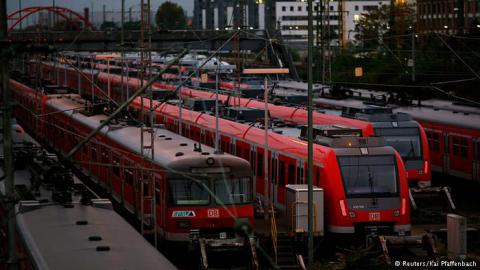German train drivers began a 66-hour strike
over pay and negotiating rights on Tuesday, which
industry said could cost as much as 100 million euros
(71.8 million pounds) a day in production stoppages.
The strike started at 3 p.m. (1300 GMT) for freight
trains and will affect passenger services from 2 a.m.
(0000 GMT) on Wednesday. About a fifth of the freight
in Germany, Europe's biggest economy, is transported by
rail and millions of commuters use the railway every
day.
The GDL union, which represents about one in 10 of
railway operator Deutsche Bahn's nearly 200,000
workers, wants a 5-percent pay rise and a reduction in
the working week to 37 hours from 39. It is also
fighting for the right to negotiate on behalf of other
employees including train stewards.
The BDI industry association said the strike would hit
the whole country and that after a few days of strikes
the cost of disruption from assembly line stoppages
could balloon to as much as 100 million daily from
about 1 million euros per day.
"GDL is acting irresponsibly and has lost all sense of
proportion," BDI manager Dieter Schweer said, noting
that the chemical, steel and auto sectors could be
hardest hit.
Germany's steel industry association, which transports
200,000 tons of raw materials and steel daily by rail,
said a three-day strike would cause "huge problems" and
could cost the sector millions of euros in additional
costs.
The DIHK chambers of commerce also criticised the
strike, with chief economist Alexander Schumann saying
it was not only an annoyance for commuters but that it
could cost firms "a significant amount of money".
GDL chief Claus Weselsky told German radio the strike
was Deutsche Bahn's fault because the state-owned rail
operator would not sign up to what had already been
agreed.
"GDL is walking out not because train drivers want to
go on strike but it had to declare the talks as having
failed," he said. "I'm not playing with a poker face
any more."
Strikes in Germany are relatively unusual due to a
system of collective bargaining between unions and
employers which are usually settled at the negotiating
table.
Deutsche Bahn said that it aimed to have about one
third of trains running.
(Reporting by Madeline Chambers; Editing by Stephen
Brown and Louise Ireland)


Spread the word